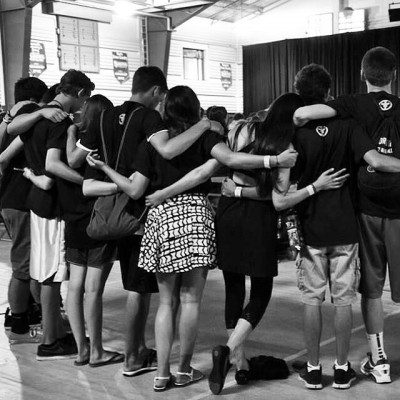Recently, some young twenty-somethings and teens begged me to write about the difficulties of being Catholic at those ages and what could be done about it. After talking with some young adult ministers, young adults and doing some additional research, I recognized some common threads in the struggles and strengths of those who seem to have found a way to maintain their faith.
The Issues:
Hell! No, really, it is an issue.
It seems that in the late teens and early twenties, many people easily accept the idea of heaven, but cannot grasp that a good God who is merciful would ever send anyone to hell. This opens the door to ideas of moral relativism (whatever is good for you is good for you, but what I think is good for me is equally good) or a dismissive attitude towards teachings that are difficult (for example, the Church's teachings on sexuality). The flip side is that some of these young people do not understand the salvation Christ offers us, thinking instead that they must be 'perfect' to be an active member of the Church.
There is a lack of things for young people to be involved in. Other than youth group, a lot of churches seem to 'drop the ball' when it comes to 16-30 year olds. We see a huge drop off in church attendance during those years. Oddly, that age group tends to develop very strong friendship ties during those years outside of the Church. We see young people return to worship after they are married and desire Baptism for their own children.
Mass just isn't a priority, especially first thing on Sunday morning after working, studying, or partying the night before. They are tired, hungover, or bored, and they don't see how the Mass is feeding them.
Solutions:
Hell is real. It is a dogma of the Church and we can't be afraid to discuss it. Padre Pio once said, "They will very well believe in hell when they get there." Blessed Richard of St. Anne, the children of Fatima, St. Teresa of Avila and St. Gemma Galgani all had stories of either being taken to hell or shown the suffering there. Helping young people stay connected means being unafraid to take on hard issues or teachings.
We also need to help young people understand the story of Salvation in a very real way. We need to properly instruct them in the Sacraments, most importantly the Eucharist (which will increase their desire for the Mass) and Confession so that they will realize that there is an ongoing avenue for grace for all of us sinners!
Our Parishes have to develop and promote activities for our young people to be involved in. St. John Paul II constantly reached out to them, reminding that they are the future of the Church. We need to do the same. We have to recognize the tools and issues our young people are involved in. How do we support young, or unmarried parents? Do we reach out with opportunities for young adults to come to Confession in creative ways? Our parish priest recognized that many teens were at Church for an activity one evening, so he just offered Confession since they were already there. He heard Confessions for almost three hours! We have to think outside the box, or in this case, the Confessional.
Having a young adult group that spins off the Youth Group is another way to reach out. Sending our high schoolers to programs like LEAD at the Franciscan University of Steubenville, so they can increase their understanding of Church teachings and develop leadership skills, so they have the tools to transition into a young adult group, is one way to accomplish that.
Offering Masses on Sunday evenings may be another way to reach these very busy young adults. Programs such as LifeTeen offer energetic ways to keep teens and young people engaged in the Mass.
Mentor programs and accountability partners. One young mother (in her twenties) shared with me, that having someone a little older, well grounded in the teachings of the Church, really helped her get though the tough times. She told me that having someone to talk her through her early marriage days, and having her first couple children was beneficial to her in keeping and practicing her faith.
PreCana follow ups and reunions. Since many people come back to Church when they seek to be married, we have an opportunity to reach out and continue those relationships after PreCana. This can lead into opportunities to support and mentor, as well.
It is easy for Young Catholics to feel like they are the only people out there who feel the way that do. The world is a difficult place to find faith, but networking by using current technologies can help connect young adults who have similar values thus decreasing isolation.
It is vital that we reach out to our younger Catholics in a positive, supportive way, meeting them where they are and addressing their needs. They are our future!! God bless.
Copyright 2015 Mary Lou Rosien.
This article first appeared on Amazingcatechists.com.
About the Author

Mary Lou Rosien
Mary Lou Rosien is a Catholic wife, mom to seven, educator, writer, and speaker. She is the author of several books including Three Things Divorced Catholics need to Know and The Joy-Filled Broken Heart. She is known for her love of all things cooking and baking, especially “Friday cookies.” Visit her at CatholicFamilyBootCamp.com.



.png?width=1806&height=731&name=CatholicMom_hcfm_logo1_pos_871c_2728c%20(002).png)
Comments